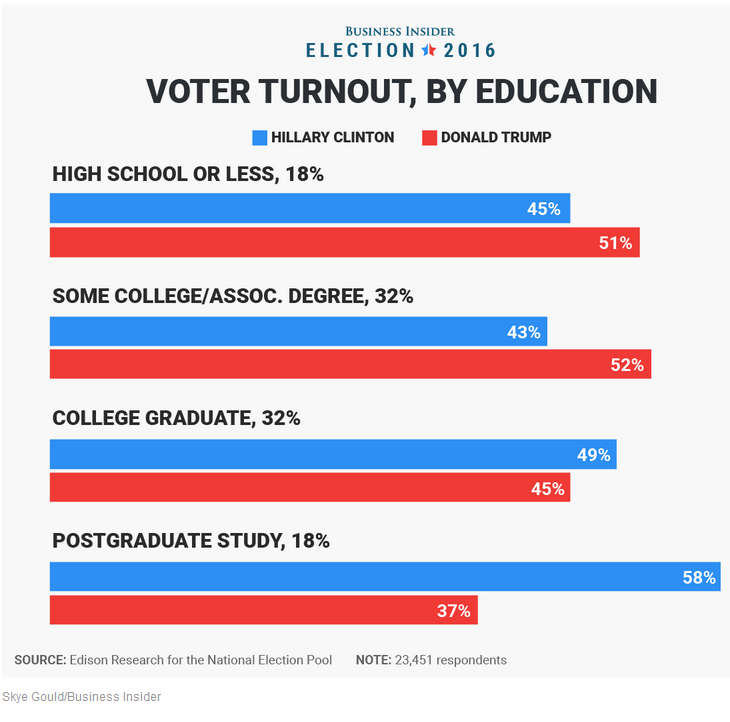What do the next four years mean for four-year institutions? What President Trump has said and what will happen are anyone’s guess.
College Educated Voted for Trump
First, let’s put aside the commonly repeated myth that he was elected by the uneducated. Voters with only a high school education actually made up only 18% of the electorate. The majority of voters were either college graduates or had at least some college and the President had a 9% lead with this group, according to Edison Research for the National Election Pool. While more education meant a higher likelihood of voting for Clinton, the numbers below show it was hardly a shut-out. The question is, what now?

Trump’s Impact On Student Loans
The focus is likely to be on tuition and student loans – now a $1.3 trillion drag on the economy. Trump said on the campaign trail that he would encourage institutions with large endowments to address tuition costs or risk their tax-free status. This reflects a draft of a Republican bill that requires universities with $1 billion or more in endowments to put 25% of their income toward student financial aid. Such a move would affect about 91 schools in the US. There have been some discussions of colleges being held financially accountable if former students default on loans, but no practical system has been put forth. The eventual outcome of such legislation would be dire – schools would certainly impose stricter limits on lending to protect themselves, and perhaps even change the majors offered, to steer students toward sectors meant to yield the highest incomes.
While still a candidate, Trump discussed a possible change in student loan income-based repayment terms, suggesting an increase in the percentage paid from 10% to 12.5% of adjusted gross income, but decreasing the timeframe of payments from 20 to 15 years,after which the balance would be forgiven. Another topic was moving government out of student loans altogether and underwriting private sector banking.
Trump and the HB-1 Visa
Currently, 19,220,161 US students are enrolled in institutes of higher learning. With the high school graduation rate of about 3.3 million expected to plateau for the next decade, colleges will continue to look for growth from foreign enrollment, which has increased 7.1% since 2014. According to the Institute for International Education, of the 1,043, 839 foreign students currently enrolled in US colleges, almost half are from China and India.
Trump’s restriction of visitors from 6 Middle Eastern countries, could snowball into broad restrictions of F1, J1 and M1 visas and the 20,000 graduate students covered by the H1-B visa. In the words of Dr. Michio Kaku, “Without the H1-B visa, the American scientific community would collapse…50% of all PhD candidates are foreign born.” Without a clear position from the White House, it’s not unthinkable that applications from foreign student will fall, as they decide not the chance their future.
Deferred Action for Childhood Arrivals
Higher education leaders have already petitioned the government to leave the DACA program alone and beneficiaries are looking to their schools to provide sanctuary. DACA currently grants temporary protection to live and work in the US to 700,000 young people who were brought into the US illegally by their parents. It is a 2-year renewable program, and not a path to citizenship. It covers those who were brought to the US before the age of 16 and who have continuously lived here. But Trump has criticized DACA, and the future remains murky. Some college websites advise students who are not already registered under DACA to seriously consider whether they want to expose themselves by applying. Given the administration’s threats to cut federal funding to “sanctuary cities” the ability of universities to protect their students from prosecution is doubtful.
So is outlook all doom and gloom? Like anything with the nascent administration, no one can say until it happens.
